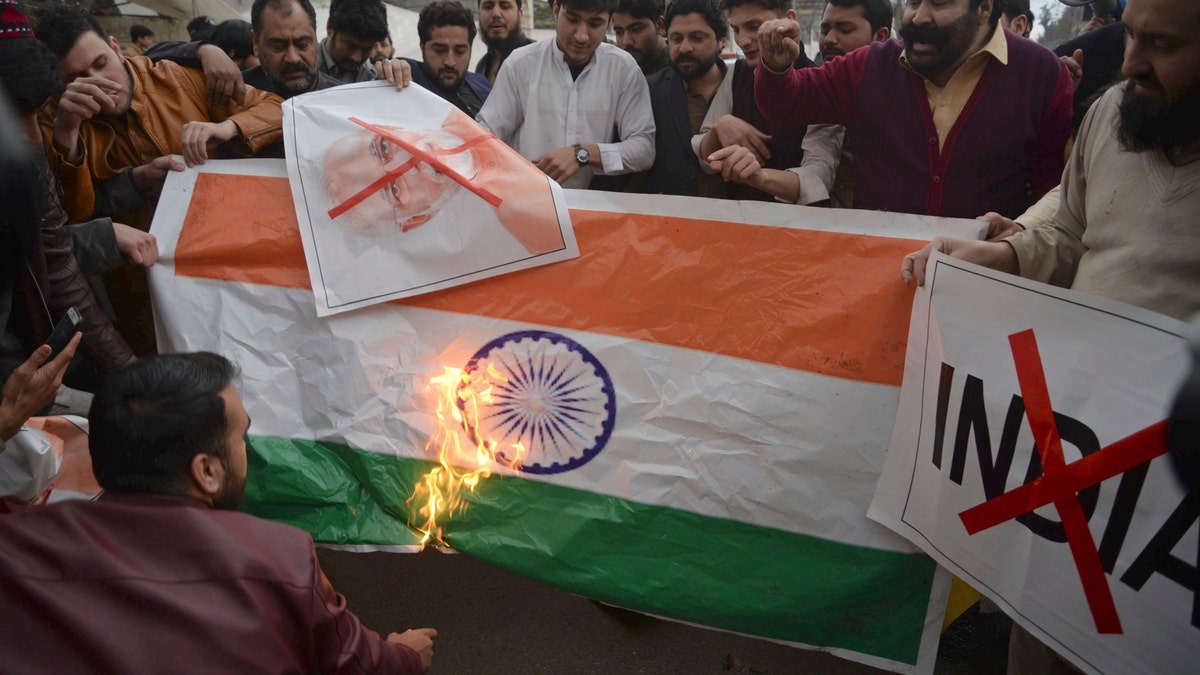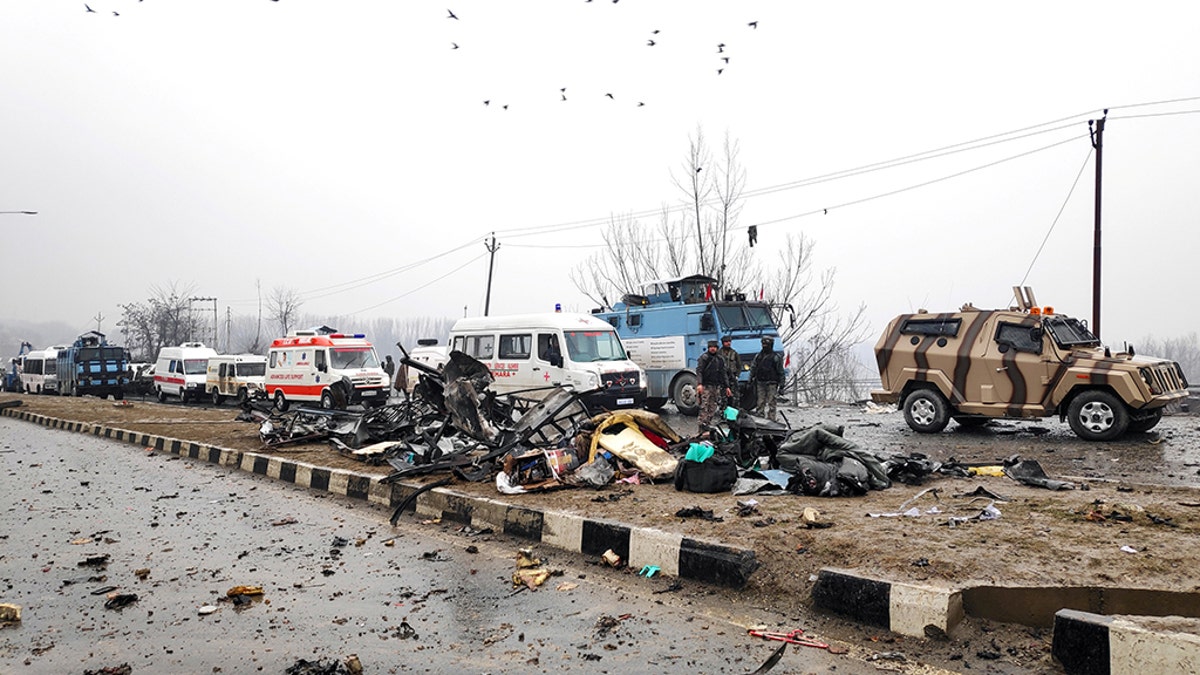
Pakistani protesters burn a representation of an Indian flag during an anti-Indian rally in Peshawar, Pakistan, Tuesday, Feb. 26, 2019. Pakistan said India launched an airstrike on its territory early Tuesday that caused no casualties, while India said it targeted a terrorist training camp in a pre-emptive strike that killed a "very large number" of militants. (AP)
India launched an air strike on Pakistan which was targeted at "terror camps" of the Jaish-e-Mohammad (JeM) group in the town Balakot early Tuesday morning.
The overnight raid comes in light of a deadly suicide bombing earlier this month that killed more than 40 Indian soldiers, which the Pakistan-based JeM group claimed responsibility for. The bomber, who made a video before the attack on Feb. 14, was a resident of Indian Kashmir.
Pakistan has denied involvement in the attack but has vowed to respond to any Indian military operation against it. After news broke of the air strike on Tuesday morning, anti-India rallies were held in Pakistan, as angry residents burned the Indian flag.
The strike is a significant move escalating tensions in an already increasingly violent conflict. India claims the strike killed a "very large number" of Pakistani militants, but Pakistan says that there was no damage or casualties as a result of the strike.
Pakistan's military spokesman, Maj. Gen Asif Ghafoor, said the Indian "aircrafts" crossed into the Muzafarabad sector of Kashmir, which is split between the two countries but claimed by each in its entirety. He said Pakistan scrambled fighters and the Indian jets "released payload in haste" near Balakot, on the edge of Pakistani-ruled Kashmir.
In response to Tuesday's attack, Pakistan has said the country will respond "at the time and place of its choosing," BBC reports.
India's foreign secretary, Vijay Gokhale, told reporters in New Delhi that Indian fighter aircraft targeted JeM camps in a pre-emptive strike after intelligence indicated another attack was being planned.
"Credible intel [intelligence] was received that JeM was planning more suicide attacks in India. In the face of imminent danger, a pre-emptive strike became absolutely necessary," he said.
"Acting on intelligence, India early today stuck the biggest training camp of Jaish-e-Mohammed in Balakot," he continued. "In this operation a very large number of Jaish-e-Mohammed terrorists, trainers, senior commanders and Jehadis being trained were eliminated."
Pakistan has outlawed Jaish-e-Mohammed and seized its properties in south Punjab's Bawahalpur area, including religious schools and mosques. India has demanded that Jaish-e-Mohammad leader, Azhar Masood, be listed as a terrorist by the United Nations, but has been stymied by China.
Balakot police chief Saghir Hussain Shah told The Associated Press that he sent teams to the area where the Indian bombs reportedly hit, which he described as a mostly deserted wooded area.
"There are no casualties, there are no damages on the ground because of the dropping of the bombs," he said.
There was no immediate explanation for the differing accounts, but India and Pakistan routinely contradict the other.

Indian soldiers examine the debris after an explosion in Lethpora in south Kashmir's Pulwama district February 14, 2019. (Reuters)
This is the second attack in Kashmir in February alone, as the disputed region remains occupied by Indian soldiers. The Feb. 14 attack, in which a suicide car bomber crashed into a van carrying Indian police officers, was the worst on Indian forces since the start of the 1989 insurgency in Kashmir and came as Indian Prime Minister Narendra Modi is in the middle of a re-election campaign.
VENEZUELAN TROOPS ABANDON POSTS AMID VIOLENT CLASHES WITH PROTESTERS AT COLOMBIAN BORDER
Insurgents in Kashmir have been demanding either outright independence or union with Pakistan. India routinely accuses Pakistan of arming and training militants who cross the mountainous Himalayan region. In the last year, an increasingly bloody crackdown on insurgents in Indian-ruled Kashmir has escalated tensions in the troubled region.
Kashmir has been the cause of two previous wars between the uneasy nuclear neighbors. They fought a third war in 1979 over East Pakistan, which gained its independence with the help of India and became Bangladesh.
Pakistan's Foreign Minister Shah Mahmood Qureshi condemned Tuesday's incursion, saying New Delhi had "endangered" peace in the region for political gains.
"We are a responsible nation and our forces are capable to defend each every inch of our motherland," he told a local television channel.
The Associated Press contributed to this report.






































